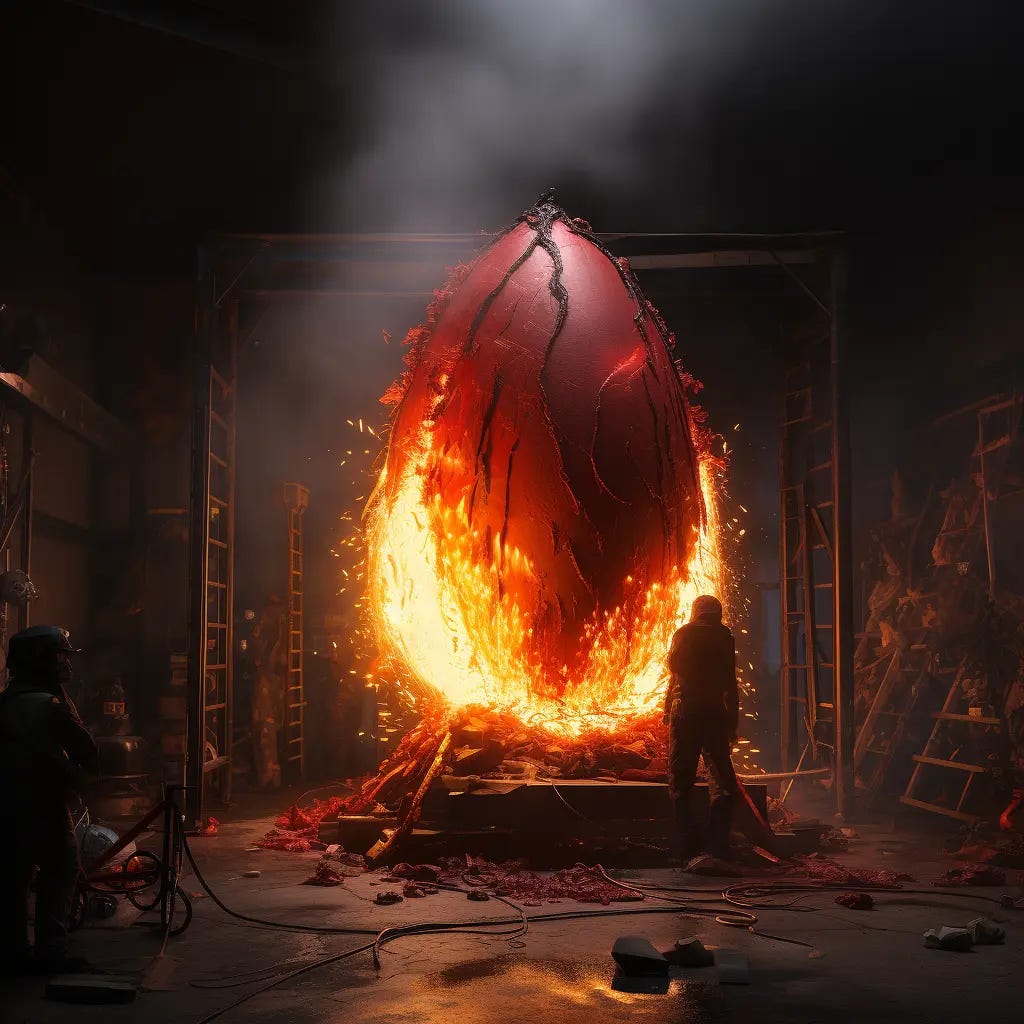Modern Midwifery
Flash fiction, 900 words. For IAM's Jan. 3 prompt. It's snowing outside! A lot.

“Landry, that is not the right way to make an omelet.”
Steph Landry looked over her shoulder as Bossman entered bearing gifts. Two coffees, cheap bodega stuff, but piping hot. He handed one to her and sipped gamely at the other.
“Funny, sir, inspired.”
Bossman used to be a diner cook before he became a phoenix breeder. He liked egg jokes. When one hatched on time, it was over easy. Fried referred to his workers’ brains. Scrambled was gallows humor. Misfortune sometimes befell even the most careful breeders.
They both regarded their latest charge with satisfaction. It was large, the veins were visible and healthy, and it had stoked its own flames from the beginning. All they’d had to do was watch and wait.
And freeze. Pheonix egg flames were cold. The room was cold. The breeding facility was a giant refrigerator. The eggs wouldn’t gestate otherwise. Counterintuitive, yes. But magic laughed in the face of rationality.
Steph opened her coffee lid and let the steam defrost her sinuses.
“Any abnormalities?” Bossman asked.
“No. All signs point to an A-2. Buffalo signed the contract already.”
“Lake effect, meet your match.”
“I just hope this one likes it there. We had to relocate the last one.”
“Well, they’re God’s creatures too … I guess. They get a say.”
“I wish they could talk. Tell us what conditions they prefer before contracts get signed.”
Phoenixes were intelligent and affable, but picky, so picky. Breeders sold them to municipalities around the world, but an innate sense of territory or aesthetics constrained whether the phoenix would agree to settle down. If one did, great – it would nest in a modified power plant and increase the heat of its flames as it grew until it generated enough energy for a town. A happily mated pair could power a city. A small family of them, once the eggs had been hatched and returned to the parents, could power the great megalopolises of the world. For a thousand years, without noxious exhausts or major inputs.
Well, except for chocolate. And teddy bears. And fine jewelry, good coffee, Faberge eggs, and … prog rock, for some reason. The more humans valued something, the more the phoenixes seemed to hold it dear. Experts guessed that it was a form of imprinting.
All Steph knew was that they loved these things in large quantities and made them more expensive for her. She didn’t begrudge them. She was just glad they didn’t seem interested in mac and cheese, because, when the mood struck, those fiery immortal birds could eat.
Bossman uttered a sudden, small gasp and ran for the controls. He typed deftly with one hand while chugging his cooling coffee with the other.
Steph wasn’t a rookie, but she wasn’t a veteran either, so it took her a minute to see what he saw: A hairline crack was forming at the top of the egg, slicing fractals down the length like little twigs of pale fire.
“It’s too early!” she cried out, at the same time pleading to the creature and warning Bossman.
“Maybe not.” He was calm.
Either the bird made it or it didn’t. They couldn’t control everything, but they had protocols for a reason. Steph jumped to, enacting them. First was to raise the temperature of the room. The egg needed cold because otherwise the embryo’s heat would cook it in its shell. But the instant the egg cracked, the outside temperature needed to match the in vitro temperature, or the poor thing might go into shock and die, collapsing in on itself into a tiny egg no bigger than Steph’s fist. It could stay in there for another thousand years, missing humanity’s chance to bribe it into providing perpetual energy.
But if the temperature difference was so great that the bird couldn’t sustain its inner fire, or if it hatched too early or too late, or if it couldn’t break the shell, it would die truly, collapsing into ash. Conditions and luck needed to be perfect. This was the fate of most phoenixes in nature, the reason phoenixes were reluctant to reproduce and why there had been so few historically. The breeding facilities were changing that, their species’ fate and ours. But it required a fine touch, and a good deal of experience.
And so Steph did exactly what Bossman said even when he went against protocol. She adjusted gauges, engaged the steam engines, even took a tiny ballpeen hammer to the shell at one point.
The shell broke. The chick was free. He was naked of feathers, wrinkled and pink, and almost flameless.
Bossman ran past her wrapped in a fire jacket, picked up the emergency flamethrower, and began to apply it to the chick’s gnarled talons and spindly tail.
The bird shivered and whimpered softly. The follicles that would eventually grow its feathers were raised, but there was nothing yet to retain heat.
The room was so hot that Steph felt like passing out. This was another constraint at hatching. There was a very narrow range that both men and phoenix could together accept.
“There we go!” Bossman stopped his ministrations and stepped back hurriedly. The chick had begun to produce flames itself. They grew stronger as its body temperature reached equilibrium.
The danger had passed.
Bossman put some shelled peanuts in the palms of his flame retardant gloves and offered it to the grizzly-sized chick.
The gift was offered, the gift was accepted. This phoenix accepted humanity’s friendship.
Steph joined him and spoke softly to the new arrival.
“I hope you like Buffalo, you little troublemaker.”

